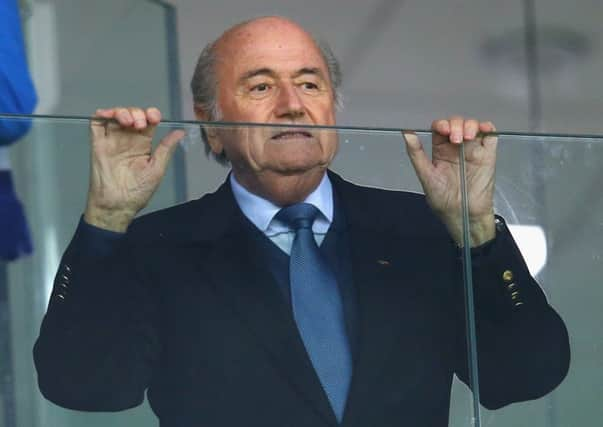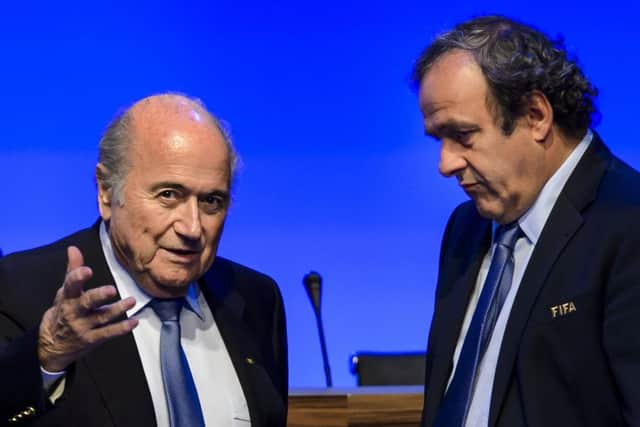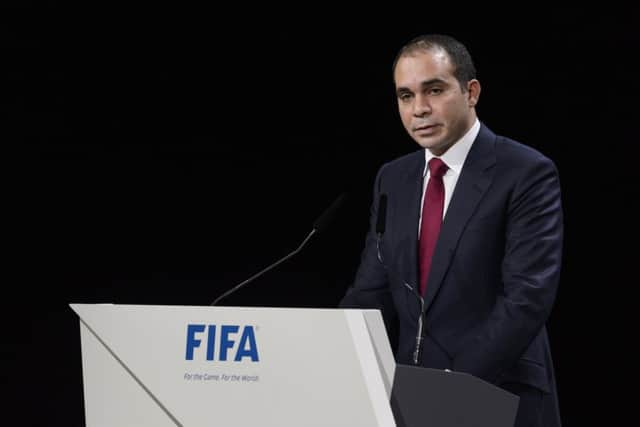Andrew Warshaw: Sepp Blatter’s still in the game


So what tipped him over the edge? Was it because the net is tightening around him in the United States, or was it simply that the sheer weight of pressure and the almost daily dose of corruption allegations simply became too much to bear – even for the great survivor?
Whatever it was, June 2, 2015, will go down as the most momentous day – at the end of a week of momentous days – in the history of football administration as a fifth four-year term for Fifa president Sepp Blatter caved in after precisely four days.
Advertisement
Hide AdAdvertisement
Hide AdUntil we have firm proof that the US investigation, which has already snared a number of top Fifa officials, runs all the way to the top, suspicion will linger about the precise reasons for Blatter’s sudden about-turn.


Swiss authorities say their separate probe into a possible breach of Swiss law over the 2018 and 2022 World Cup processes does not, at this stage, involve Blatter. So that leaves the US inquiry and, in particular, imminent publication of the evidence provided by former Fifa powerbroker Chuck Blazer whose information could prove crucial. At the time of writing, the FBI were keeping their cards close to their chests but sources were briefing media across the pond that Blazer, who turned state’s evidence, could make life extremely uncomfortable for the 79-year-old Swiss.
As the world digests Blatter’s sensational downfall – almost worthy of a Shakespearean-style tragedy – it is worth contrasting it with his triumphant election victory and subsequent press conference 18 hours later. “Why would I step down,” asked Blatter. “That would mean I recognise that I did something wrong. I fought…against all the corruption, against everything that is forbidden.”
Will those words come back to haunt him? Although US federal authorities are saying nothing official – yet – about Blatter, last week’s stunning 47-count indictment that cited a number of senior Fifa officials was never going to be the end of the affair. Unconfirmed reports suggest that a case is being built around Blatter, the man who, for many, has come to symbolise Fifa’s battle against corruption. Could the already infamous letter showing that Jerome Valcke, Blatter’s right-hand man, was aware of the $10 million payment to Jack Warner – described by US prosecutors as a bribe to secure the 2010 World Cup to the fury of the South Africans – end up being related to Blatter’s shock move?
And if that is not the case, how on earth could the game’s most powerful figure, who last Friday was seen clasping his hands together and crying, “Let’s go Fifa!”, suddenly realise his time was up?


Maybe he was simply being squeezed to breaking point by everyone from sponsors to rebellious national federations to western politicians.
Maybe he also realised that too many people now distrusted him. In the past, Blatter had always managed to find a way to survive, but the sheer number of his lieutenants who have exited Fifa in ignominy has, perhaps, finally taken its toll.
Yet, for all the euphoria in western Europe and the US at his demise, many around the world, especially in Africa and Asia, actually view his departure as a noble gesture of self-sacrifice and point to the massive increases in development funding under his tenure. Just listen to this from Amaju Pinnick, president of the Nigeria Football Federation: “Blatter feels Africa, he sees Africa and he has imparted so much. We don’t want to experiment”
Advertisement
Hide AdAdvertisement
Hide AdThat kind of rhetoric represents an important dynamic when it comes to what happens next. Will Blatter’s supporters, of whom there are a considerable number, make it their business not to allow what they perceive as the arrogant Europeans to step in and rule the roost? Uefa has cancelled its scheduled emergency session on Saturday now that Blatter has gone when it might actually have been more wise to meet anyway and devise a strategy for moving forward.
Much has been made already of Prince Ali Bin al-Hussein, conquered by Blatter last Friday, throwing his hat into the ring again, but this may not be such a clever move if Europe, this time, puts up their own man. Where would his support come from then, especially if his own Asian confederation, who never wanted the Jordanian royal to stand in the first place, puts up an alternative candidate?
Kuwaiti powerbroker Sheikh Ahmad Al-Fahad Al-Sabah, who has only just joined the Fifa exco and is a staunch Blatter ally, is already being mentioned. “He’s done a great job for football,” Sheikh Ahmad said in the aftermath of Blatter’s election victory, anathema perhaps to western European opinion but telling just the same.
The 400 staff at Fifa House where Blatter has reigned for 17 years clearly feel the same way. It is understood that he received a ten-minute standing ovation when he addressed them yesterday after changing the course of footballing history with his unexpected resignation.
Yet, he is not going quite yet. Although Blatter has no vote, don’t think for one moment that he will just drop out of sight. His critics may not like to hear it, but behind the scenes he will doubtless use his influence to push for a successor he believes in – and who believed in him.
As things stand now, an extraordinary congress will be held sometime between December and March. Before then, according to Fifa’s audit and compliance guru Dominico Scala, serious reforms will have to be put in place that far exceed those already implemented. Blatter is determined to be part of that – if only to leave a legacy that goes some way to rescuing his battered reputation.
Pivotal among these is reducing the power of confederation chiefs. Fifa’s statutes state only confederations can pick executive committee members. Blatter would like to change that to give Fifa’s 209 federations more say in the matter. As he said in his resignation speech: “The Executive Committee includes representatives of confederations over whom we have no control, but for whose actions Fifa is held responsible.” In other words, not fair.
“Deep-rooted structural change” is what Scala, who has emerged as a major player at least in the interim, wants to see. Sooner rather than later. This includes integrity checks, term limits and disclosure of salaries. Hang on a minute. Haven’t we heard this all before? Course we have. But it’s taken the downfall of the most powerful man in football to bring it about.
THE ROAD TO RESIGNATION
Advertisement
Hide AdAdvertisement
Hide AdDecember 2010: Russia is awarded the 2018 World Cup and Qatar gets the 2022 hosting rights, days after the BBC broadcasts an exposé of Fifa.
February 2011: Fifa’s ethics committee upholds three-year and one-year bans imposed respectively upon executive committee members Amos Adamu and Reynald Temarii for breaches of Fifa’s code of ethics following a Sunday Times investigation into wrongdoing during the World Cup 2018 and 2022 bidding campaigns.
May 2011: Fifa suspends presidential candidate Mohamed Bin Hammam and vice-president Jack Warner pending an investigation into claims they offered financial incentives to members of the Caribbean Football Union. It drops a complaint against Blatter.
June 2011: Bin Hammam is found guilty of bribery and banned from all international and national football activity for life. Warner escapes investigation after resigning from his position.
July 2012: Fifa commissions a report into allegations of corruption in world football which is led by former US attorney and newly-appointed head of Fifa’S ethics committee Michael Garcia.
June 2014: The Sunday Times reports it has received “hundreds of millions” of documents which it claims reveal that disgraced former Fifa executive committee member Bin Hammam had made payments to football officials in return for votes for Qatar.
September 2014: Garcia sends his report to Fifa.
November 2014: Hans-Joachim Eckert, chairman of the adjudicatory chamber of Fifa’s independent ethics committee, publishes a 42-page summary of Garcia’s investigation, effectively confirming Russia and Qatar as World Cup hosts after finding breaches by them were “of very limited scope’’. Fifa lodges a criminal complaint with the Swiss attorney general over “possible misconduct’’ by individuals but insists the investigation into the bidding process for the two World Cups is concluded. Garcia calls the summary “incomplete and erroneous” and launches an appeal against it.
December 2014: Garcia loses his appeal against Eckert’s review of his report and resigns. Fifa executives agree to publish a “legally appropriate version” of the report. This has yet to happen.
Advertisement
Hide AdAdvertisement
Hide AdMay 2015: Seven Fifa officials are arrested at a hotel in Zurich. They are later charged by US authorities along with two other Fifa officials and five corporate executives over allegations of racketeering, wire fraud and money laundering conspiracies spanning 24 years.
June 2, 2015: A letter seen by Press Association Sport reveals the South African FA asked Fifa secretary general Jerome Valcke to authorise a $10m payment to Warner to support football in the Caribbean. Blatter announces he is to resign as Fifa president.
Fifa’s hot seat… who’ll be next?
Michel Platini
The 59-year-old Uefa president did not want to stand against Blatter, but this now looks to be his opportunity to make his move. Strangely, his support for Qatar hosting the 2022 World Cup would help his chances rather than hinder them.
Odds: 2-1
Prince Ali Bin Al Hussein
Won enough votes against Blatter last week to have taken the election to a second round and has hinted he may stand again. Despite struggling to win support in his own confederation of Asia, and now facing a possible challenge from Platini, he remains favourite for the job.
Odds: 6-4 fav
David Gill
Will take up his place as Britain’s Fifa vice-president following Blatter’s decision to step down, but would be a huge surprise if he decides to stand for president. And don’t forget – much of the world still resents England.
Odds: 12-1
Issa Hayatou
Ill-health and questions about his own probity mean he is unlikely to stand despite being president of the powerful bloc of African football.
Odds: 20-1
Michael Van Praag
The Dutch FA chief stood against Blatter until pulling out of the race to back Prince Ali. He would struggle to get much support from the world outside of western Europe.
Odds: 10-1
David Ginola
The “stunt” candidate who was put up by a bookmaker to run against Blatter before failing to get a single nomination, has said he will stand again. The former Newcastle and Tottenham winger is likely to suffer the same fate.
Odds: 33-1
Sheikh Ahmad Al-Fahad Al-Sabah
Advertisement
Hide AdAdvertisement
Hide AdSports powerbroker from Kuwait already rules the roost in Olympic circles and Asian football. He has just been elected to Fifa’s executive committee and, if he stands, could pick up old Blatter loyalists.
Odds: 20-1
Zico
The Brazilian great, currently the coach of Indian club Goa, is giving serious thought to becoming a candidate in the race. Zico, who said he has the support of his wife and children, is not likely to be considered a major player in the election, though.
Odds: 20-1